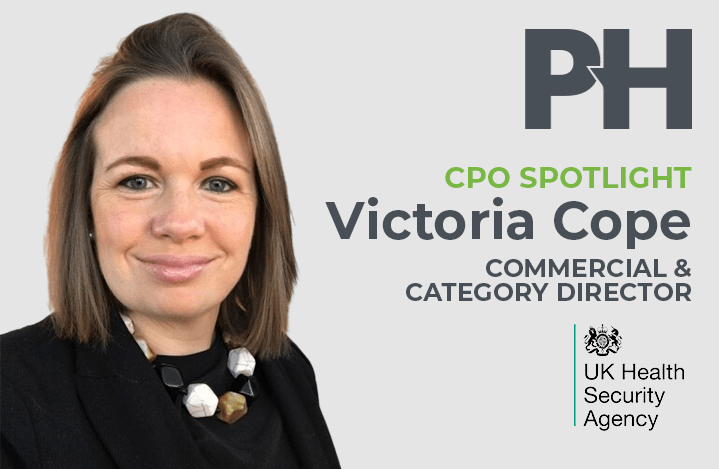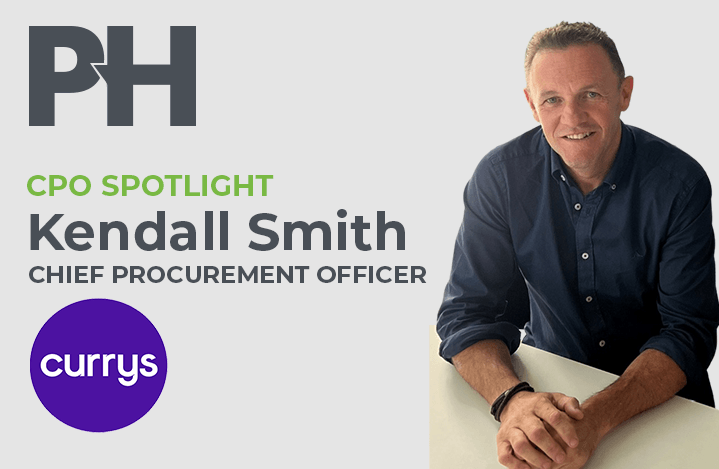For Procurement Heads‘ latest CPO Spotlight, she spoke with Ben Stickland from our Public Sector team about her career.
You previously took part in our Big Interview series in 2021, how much has changed for you professionally since then?
Since we last spoke I am delighted to have made the move into public sector procurement and joined the Government Commercial Function as the Commercial & Category Director for the UK Health Security Agency.
The Government Commercial Function was established seven years ago to build a cadre of commercial talent in all Government departments.
The GCF is a group of commercial leaders who can manage our commercial portfolios and lead our most complex and novel programmes and projects, with gravitas and the depth of experience to work alongside our Ministers, policy and operational leaders to develop innovative commercial arrangements, whether through joint ventures, outsourcing or best-in-class contracts.
The move to the public sector has allowed me to make an even greater impact at scale across government.
The UK Health Security Agency posed a rare once-in-a-lifetime opportunity to join a ‘start-up’ organisation within government and establish and develop a green field commercial function.
In addition to the day job, I have had the honour of being made a Fellow of CIPS, World Commerce & Contracting and the Royal Aeronautical Society.
I am also privileged to have been recognised as one of World Commerce & Contracting’s Inspiring Women in Commercial 2023 alongside other amazing commercial and procurement leaders.
Your professional career began as an aircraft engineer, what made you consider a shift to the world of procurement?
As I progressed through my engineering career I benefitted from moving into a role that allowed me to apply my technical background and operational analysis skills to support governments across the world on their defence procurement policy and multi-million-pound procurement decisions.
I realised that I enjoyed using my influencing and negotiation skills to deliver value to stakeholders and made the decision to move into the sales and contracting function.
Since then, I have spent the last 20 years building my career journey transitioning between the buy and sell aspects of the commercial profession, having had the benefit of working within some fantastic organisations including, BAE Systems, QinetiQ, Airbus, Unilever and currently the Government Commercial Function.
I have had the opportunity to lead the commercial function of £12bn+ organisations, establishing green field functions, and leading high-impact, cross-sector social value programmes.
I am passionate about the commercial profession as it provides the ability to make an impact at scale.
Helping organisations define and deliver their strategy, use commercial innovation to achieve enhanced competitiveness and the resultant growth in revenue and market share, and identify, manage and mitigate third-party risk to the organisation.
In my early career doing a ‘great deal’ was something that gave me those ‘Yes!’ moments, whether it be with suppliers, customers or investors.
Today seeing my team shine, creating and delivering world-leading commercial strategies and innovative commercial models, doing deals which deliver both financial and social value and seeing them achieve their full potential as a team, as well as individuals, inspires me daily.
You’re now Commercial & Category Director at the UK Health Security Agency, what does your role entail?
I have a double hatted role encompassing both procurement and commercial within the directorate – leading the category, contract and business development teams within UKHSA.
It has been a transformational role to date setting up the commercial function from scratch within the new start-up agency that is UKHSA.
As a function we have:
- More than 150 staff
- A contract portfolio of £13bn
- Over 550 suppliers – 53% are Small to Medium Enterprises
- 320 partners & customers
- Partner with Industry, academia, non-profit & public organisations
- 90% of our active partners are UK based & 10% in over 30 countries
A key part of the role is developing the strategy and commercial capability with the function as well as the commercial acumen across the wider Agency.
I have the pleasure of leading a governance reset and I chair our investment and approval boards and ensure robust commercial advice and assurance is provided to our Executive Committee, Board & Ministers.
A wider part of my role is as the Senior Responsible Officer for a number of cross-functional programmes within UKHSA and the wider health family.
And what role does procurement play in embedding sustainability across the organisation?
Procurement is key to driving sustainability and social value within our own organisation’s operations but also within our supply chain’s ecosystem.
As an organisation, we understand the importance of sustainable development in ensuring we can continue to deliver impactful scientific outcomes, value for money and positive impact in the wider community.
UKHSA recognise that both as an organisation and within our supplier and partner ecosystems we can make a contribution towards sustainable development and this commitment falls in line with UKHSA’s strategic goals and priorities, including our centre for climate change.
Our operations have an impact on the environment from the resources we consume to the waste that we generate.
We are committed to reducing the environmental impact of our operations where possible, minimising our environmental footprint and in turn, decreasing our operational costs and increasing efficiency.
There are a number of levers which procurement use in order to make a sustainability normal business.
One of which is the implementation of social value through all our procurement activities.
The UK Government’s Social Value Act 2012 and more recently the social value model are fantastic tools to ensure that social value delivery is considered as part of the tender evaluation and subsequent contract performance management through life.
We have the ability to not just politely sign post sustainability, or double count existing activity but raise the bar and drive tangible social value outcomes which make an impact beyond the boundaries of our own organisation.
You talked about the Social Act of 2012 and how you are integrating supplier diversity into end-to-end Procurement day-to-day. How important do you think it is for diversity and inclusion within Procurement as a profession?
It is absolutely fundamental to the profession and the success of organisations.
I personally identify with a number of different characteristics including disability, being a parent and being female.
It is absolutely fundamental that we have a cadre of diverse talent across the organisation, who can be their authentic selves at work, and bring a diversity of thought to help us to deliver on our organisational priorities.
In procurement we have the benefit of being more diverse and inclusive compared to many other professions I have worked in; however, I think there is far more to do to raise the bar.
When I reflect on my early career in procurement and commercial, I didn’t see many CPOs who were female or openly identified with disability at that time.
As they say ‘you can’t be what you can’t see’.
Therefore, it’s incredibly important to be able to share your authentic self and celebrate that we are all different, we are all unique, and we all have different parts we can play and value we can bring to the table.
Having different characteristics, diversity of thought and critical experiences is what makes diverse teams fun and what we need around the board table to help our organisations deliver their priorities.
What are some of the biggest challenges facing the UK Health Security Agency at the moment, and how is procurement helping the organisation face these?
UKHSA is an Executive Agency with a delivery focus, an incredibly high tempo and a complex and ever-changing commercial environment.
We have a contract portfolio of £13bn with over 500 suppliers and 300 customers.
We have to employ innovative and agile commercial approaches to deliver robust, optimised, sustainable and enduring commercial outcomes and value for money for the taxpayer.
The biggest challenge has been establishing the Agency and commercial function, transitioning Test and Trace, Public Health England, Joint Bio Security Centre and Vaccine Task Force into one organisation whilst continuing to deliver our operational imperatives.
Balancing strategic planning for the future, and building the function’s capacity and capability whilst delivering outcomes for the public has been a unique and exciting opportunity.
A key operational challenge has been leading the ramp-down of the COVID-19 operations as part of the government’s Living with Covid strategy and concurrently building a sustainable commercial model for surge operations for multiple wider emergent health threats.
The team have developed an efficient, effective and agile demobilisation policy, procedures and delivery programme which was flexible to the needs of health demand forecasting and public policy decisions, whilst ensuring that the operations were demobilised as swiftly, efficiently and sustainably as possible whilst maximising value for money for the taxpayer, via delivering six-figure savings and income generation from demobilised assets, stock and intellectual property created.
A key to dealing with crisis and peacetime situations is to engender a growth mindset, leverage best practices developed to date including from wider government and industry and capture agile practices and lessons learned to inform the development of a dynamic surge model for wider pathogens and health threats; embedding corporate memory and best practices developed in the Test and Trace operations and optimising these for future use.
This ensured that in a matter of hours, preparedness targets could be met and effectively responded to which was successfully demonstrated during the recent Mpox outbreak and Heathrow testing operations.
As a CIPS Fellow, how important is continual professional development to you – and what are the benefits of becoming a CIPS Fellow?
Continual professional development and lifelong learning are fundamental for me and CPD is something which energises me.
CPD enables me to keep at the top of my profession both from a technical and leadership perspective and also allows me to bring wider learnings into the organisation to the benefit of my team, colleagues, mentees and wider network.
The supply chain ecosystem in this VUCA world is moving quicker than ever before and its key engages in thought leadership to help ensure that procurement as a profession develops and drives innovation and agility to meet the challenges, both known and unknown, that lay before us.
Becoming a Fellow is an absolute honour and the Fellows network is a highly inclusive group of cross-sector leaders who positively shape and develop the next generation of procurement talent as well as raise the profile of the procurement profession.
There is a wealth of knowledge, expertise and opportunities to share this as part of networking and thought leadership events that are offered as part of being a CIPS Fellow.
The Fellowship group is a family of inspiring senior leaders that, even at this stage in my career, I gain a great deal from the collegiate support and energy we provide to each other.





